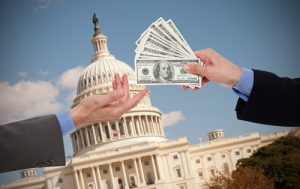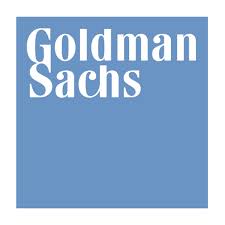Goldman Sachs Control the SEC
With the departures of Gary Cohn, Steve Bannon, and Dina Powell from the White House, has Goldman Sachs’ initial influence on the Trump Administration dwindled?
The wrote: “Jay Clayton, Goldman Sachs’ past and likely future lawyer, is not alone in the Trump-Goldman axis at the SEC. To better understand how corporations consistently manage to maneuver ostensibly independent agencies in their interest, it is instructive to consider one of Clayon’s “Senior Policy Advisors,” Alan Cohen.
Before Cohen joined the SEC in the summer of 2017, he “served as Goldman’s compliance head for 13 years, after joining the bank in 2004 as a partner from law firm O’Melveny & Myers.” It makes sense that Clayton would reach out to Goldman for senior advisors — not only did Clayton represent Goldman while Cohen was helping run the megabank, Clayton’s wife worked at Goldman Sachs until Clayton’s ascent to the SEC. It’s a small and quite rich circle in which the likes of Clayton and Cohen run.
But while the “how” of Cohen’s rise to SEC prominence is sadly intuitive, the “what the heck” nature of the hiring merits significant explication.
First, what does it mean to have been in charge of “compliance” for Goldman? Per their website, “the global compliance division is dedicated to protecting the reputation of the firm and managing risk across all business areas.” The compliance division is supposed to “ensure compliance with regulatory requirements and determine how the firm can appropriately pursue global market opportunities.”
How did Goldman do under Cohen’s reign? Not well. Not well at all.
Recent weeks have brought an avalanche of news about how Goldman Sachs is at the center of an epically corrupt Malaysian state investment fund called 1MDB. Indeed, just this past Monday (November 12th, 2018), “Goldman Sachs shares slumped the most since November 2011 after Malaysia’s finance minister demanded a full refund of fees it paid the bank tied to a doomed investment fund.”
Why is Malaysia furious at Goldman Sachs? Goldman played a key financial architecture role in the 1MDB fraud. Their engineering assistance to the scheme has already led a senior Goldman banker to plead guilty and has touched Goldman CEO Lloyd Blankfein (Blankfein twice met with the Malaysian fraudster, Jho Low)
It was Cohen’s job to ensure Goldman bankers did not do several of the specific acts that “former senior Goldman Sachs banker Tim Leissner pleaded guilty to,” launder money and violate the Foreign Corrupt Practices Act by paying bribes.
These actions by Goldman under Cohen’s watch are also actions governed in part by the SEC itself. Cohen failed to prevent crimes policed by the SEC, and now he is a senior figure at the SEC.
Given the laxity of current ethics law, so long as Cohen doesn’t specifically meddle in an investigation into Goldman Sachs like 1MDB, he needn’t recuse. That means Cohen can advise on broader enforcement priority issues that implicate SEC policy toward money laundering and the Foreign Corrupt Practices Act, even if he cannot interfere in this specific investigation.
The corruption of Goldman that 1MDB represents is, of course, not the exception but rather the norm for Goldman under Cohen’s watch.
For instance, the SEC is now investigating allegations from a former senior investment banker at Goldman Sachs, James Katzman. Katzman “raised concerns about what he viewed as unethical conduct at the bank” via Goldman’s whistle-blower hotline in 2014. Rather than take Katzman’s concerns seriously, “David M. Solomon, who is now Goldman’s chief executive, urged Mr. Katzman to move past his complaints, and he left the firm in 2015.”
Indeed, Katzman initially felt silenced by a confidentiality agreement with Goldman. A serious compliance director would seek to act on the concerns of a whistle-blower, rather than stifle their complaints.
There are other issues. For instance, one can hardly avoid laughing at the dark comedy of the Forbes headline, “A Bad Omen When Goldman Sachs’ Compliance Staff Is Charged With Insider Trading,” noting that “Perhaps Goldman Sachs needs to hire compliance staff to monitor its compliance staff.”
However, the biggest issues at Goldman under Cohen’s watch cut to the core of the Great Recession.
Consider the take of the Justice Department on Cohen’s handiwork. “The Justice Department, along with federal and state partners, announced today a $5.06 billion settlement with Goldman Sachs related to Goldman’s conduct in the packaging, securitization, marketing, sale and issuance of residential mortgage-backed securities (RMBS) between 2005 and 2007.”
If you watched The Big Short and came away unimpressed by the ethics of Goldman Sachs, or if you agree with Matt Taibbi’s colorful claim that the “world’s most powerful investment bank is a great vampire squid wrapped around the face of humanity, relentlessly jamming its blood funnel into anything that smells like money,” then you think Alan Cohen failed at Goldman Sachs.
But enough about the past; what is the SEC currently doing that would make Clayton and Cohen especially valuable to Goldman Sachs?
Per Bloomberg, one big priority for Wall Street is to make sure that European investor protections “don’t spread to America.” Bloomberg notes that the “dustup is playing out behind closed doors in Washington at the Securities and Exchange Commission, where brokers want the agency to make clear they can continue combining the cost of financial research and trading in one bill for U.S. customers — the practice that is being banned in the European Union.”
And who is at the center of this closed door effort by the SEC to ensure Goldman and comparable firms can reap profits European regulators have determined are unfair? Alan Cohen, whose hiring was announced by a press release stating that Cohen was hired in part to advise Clayton on issues including “new European Union regulations (e.g. MiFID II).”
Pro-investor groups and large state pension systems that manage money for government employees object to this set up.
Typically, Goldman Sachs is the favorite in a dispute against “investor groups” and “state pension systems” because Goldman is richer, more powerful, and savvier about the inner workings of the government than its opponents.
Hopefully, that is not always going to be true.
The Revolving Door Project has announced an Independent Federal Agencies Leadership Tracker because agencies like the SEC are obscure to nearly everyone who doesn’t have business before them. In other words, banks like Goldman Sachs wield influence over the SEC because it matters enormously and directly to their bottom line. Figures like Alan Cohen are not exceptions but the norm.
That should change.
The Revolving Door Project is committed to educating the broader public about issues previously rendered obscure by entrenched banks operating exclusively in their self-interest.”


